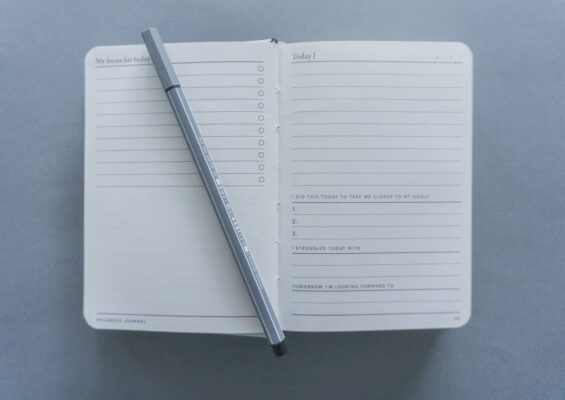Writing online still doesn’t come natural to me, but I’ve kept a personal journal (or diary, I suppose) for years. Over the last couple weeks, I’ve come back to the idea of setting and following through with health goals, so it seemed natural this week to discuss one of my own personal practices: journaling!
Importantly, this about more than just writing in a notebook—journaling is a proven strategy for personal growth, accountability, and mindfulness. Here’s how it helps:
1. Increase Accountability
One of the biggest challenges in achieving health goals is staying consistent. Journaling helps by creating a record of your actions and progress.
- Track your progress: Write down your workouts, meals, and milestones. Seeing your accomplishments can motivate you to keep going.
- Spot patterns: Reviewing your entries can reveal habits—good or bad—that affect your results. For example, you might notice you feel more energized after eating a balanced breakfast.
- Commit to consistency: Writing daily reminds you of your goals and reinforces your commitment to achieving them.
2. Boost Self-Awareness
Understanding yourself is key to making lasting changes. Journaling allows you to reflect on your thoughts, emotions, and behaviors.
- Uncover triggers: Are you eating out of boredom or stress? Journaling can help you identify emotional triggers for unhealthy habits.
- Recognize progress: Beyond numbers on a scale, journaling highlights non-scale victories, like increased energy or better sleep.
- Set intentions: Writing down your “why” helps you stay connected to your deeper motivations.
3. Reduce Stress
Stress can sabotage even the best health plans. Journaling is a therapeutic way to process your feelings and reduce stress.
- Brain dump: Offload worries or frustrations onto the page instead of keeping them bottled up.
- Focus on gratitude: End each entry by listing three things you’re grateful for. Gratitude journaling has been linked to improved mental health and better sleep.
- Plan your day: Use journaling to create a daily or weekly health plan, which can alleviate decision fatigue and keep you focused.
4. Stay Motivated
It’s normal to lose steam on your health journey. Journaling can reignite your motivation by reminding you of your progress and goals.
- Celebrate small wins: Document every success, whether it’s trying a new recipe, running an extra mile, or choosing water over soda.
- Revisit your goals: Flip back through your entries to see how far you’ve come. That reminder can be the boost you need to keep going.
- Visualize success: Write about how achieving your health goals will feel and the benefits it will bring to your life.
5. Problem-Solving Tool
When challenges arise, journaling can help you brainstorm solutions and adapt your plan.
- Identify obstacles: Write about what’s holding you back. For example, are you struggling with time management or unhealthy cravings?
- Find solutions: Reflect on how you can overcome these hurdles. Journaling helps you approach problems creatively and strategically.
- Track changes: Experiment with solutions and note what works, so you can refine your approach over time.
6. Support Mental Health
Good mental health is essential for achieving physical health. Journaling nurtures your emotional well-being, which can directly impact your physical goals.
- Process emotions: Writing about your feelings helps you cope with stress, anxiety, or self-doubt.
- Build confidence: Acknowledging your efforts and progress fosters a positive self-image.
- Foster mindfulness: Journaling helps you stay present and intentional in your choices, from eating to exercising.
7. Create a Personalized Roadmap
Your health journey is unique, and journaling helps you tailor your plan to your needs.
- Customize your goals: Track what works best for you, whether it’s morning workouts, intermittent fasting, or meditation.
- Adapt over time: Life changes, and so do your needs. Journaling allows you to adjust your goals and strategies as necessary.
- Keep it real: Writing candidly about your struggles and victories creates a realistic, sustainable roadmap to success.
Tips for Starting a Health Journal
- Choose the right medium: Whether it’s a physical notebook, a digital app, or a bullet journal, pick what works for you. I personally use a physical notebook, but I have seen digital versions work for others!
- Set a routine: Write for a few minutes each morning or evening to build the habit.
- Be honest: Your journal is a judgment-free zone, so write openly about your thoughts and experiences.
- Include prompts: Not sure what to write? Use prompts like:
- What went well today?
- What could I improve on?
- How did I feel after today’s workout or meal?
Examples of Journaling for Health Goals
- Meal Tracking: Log your meals and snacks, noting how you felt afterward to identify patterns and preferences.
- Workout Logs: Record your exercise, including duration, intensity, and how you felt.
- Gratitude Entries: End your day by writing three things you’re grateful for, focusing on your health journey.
- Mood Check-Ins: Rate your mood and energy levels daily to spot correlations with diet or activity.
Ready to Start Journaling and Reach Your Health Goals?
Journaling is a powerful tool for accountability, self-awareness, and motivation. It keeps you connected to your “why” and helps you navigate challenges with clarity and confidence. Pair this practice with expert guidance to supercharge your results.
At The A-List Clinic, we’re here to help you design a personalized health plan that works for your lifestyle. Start your journey today by booking a consultation. Let’s achieve your goals together!
